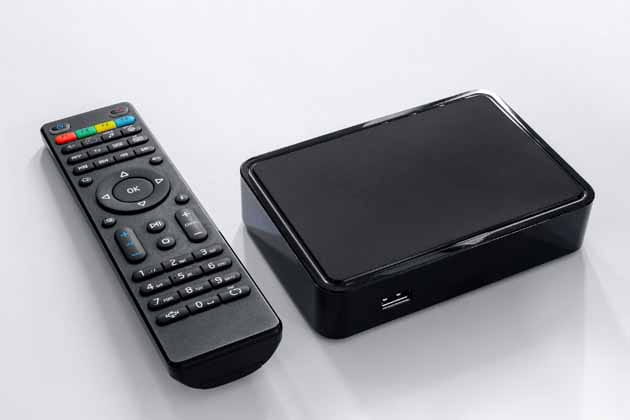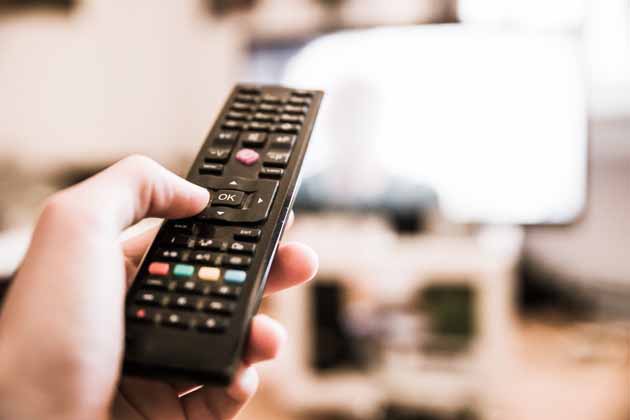IPTV stands for “Internet Protocol Television” and makes it possible to receive television programs with high-definition quality over the Internet. Television has been around since the early 20th century and over this long period of time the type of transmission has changed repeatedly. While it is mostly still transmitted via antenna, cable, or satellite, nowadays more and more non-linear television can also be watched over the Internet. The term comes up again and again: IPTV. But how does IPTV work? How is it different from other transmission options? And what advantages does IPTV offer?
How does IPTV work?
When it is said that IPTV is television via the Internet, that is true, but not expressed precisely enough. Because the IPTV signal is not received via the public Internet, but rather a closed Internet network. This works like this:
- Content of the provider
The provider makes video content available to the closed IPTV network. - Encryption of the content
A so-called encoder converts, compresses, and encrypts the content for transmission. - Transmission in the distribution network
This closed network transmits the content from the service provider to the customers*. - Decrypting the content
In order to receive IPTV, a special UHD receiver is often required. This decrypts the content before it is forwarded to the end device. - End device
The IPTV signal arrives on the end device and can be viewed. Most of the time the end device is the television, but it can also be a smartphone, laptop, etc.

By the way: Every device within a network has a unique IP address, which ensures a clear assignment of IP address and device during transmission. If you would like to find out more about other data transmission options, take a look at our articles on the 5G and LoRaWAN mobile communications standards .
Differences: IPTV, OTT, cable TV, satellite TV

IPTV
Type of transmission: closed network
Type of content: linear television (live TV shows, news, sports, films, series); non-linear television (media libraries, video-on-demand content); interactive services
End devices: television, smartphone, laptop, tablet (depending on the provider, a UHD receiver is required for IPTV)
Special feature: personalized content; Live TV programs can be paused, rewind or recorded
OTT (over the top)
Type of transmission: public Internet
Type of content: non-linear television (media libraries, video-on-demand content); Partial live streaming of events
Devices: Smart TVs, computers, tablets, smartphones, streaming boxes
Special feature: new series, films, etc. on a regular basis.
Cable
Type of transmission: Network of coaxial and fiber optic cables
Type of content: linear television (live TV shows, news, sports, films, series); Depending on the provider, also video-on-demand content
End devices: primarily televisions, but also cable tuner-capable devices (requires a cable connection & usually a cable receiver)
Special feature: provides a wide range of channels including local television stations
satellite
Type of transmission: reception via satellite
Type of content: linear television (live TV broadcasts, news, sports, films, series)
Devices: primarily television, but also satellite-capable devices (requires satellite dish & receiver)
Special feature: offers reception in remote areas, where other types of transmission are not developed or are only poorly developed

Advantages & Disadvantages of IPTV
Advantages
- Consistent HD image quality
- Simultaneous use on multiple devices: television, smartphone, laptop, etc.
- Time-shifted television as well as recording, restarting, and rewinding programs (locally and remotely)
- Personalized content & recommendations
- Partially interactive television
Disadvantages:
- Internet and IPTV providers must be the same
- The service provider may require a special UHD receiver
The way we will watch TV in the future
The future of IPTV directly parallels the future of television. You can expect the television of the future to be a fully immersive experience. Television will evolve as new and improved technologies come to market. Its development will intensify and will not only create new program formats but also push the boundaries of personalized viewing experiences that we are not yet able to understand. Added to this are engaging and playful ads (not to mention VR and AR, these topics are the subject of another article).
We’re already seeing streamers like Netflix develop interactive TV content where users decide which direction the story is going (See “Crickets vs. Wild Bear”). Instead of simply watching something on the TV screen, you have the opportunity to participate and interact with the show to potentially influence the outcome of the show and give new meaning to the “reality show”. Running Man, anyone?
Set-top boxes will likely continue to remain the most popular choice among consumers for the foreseeable future as other TV and VOD services such as Peacock, HBO Max and Disney Plus join rank among Netflix and Youtube.
FAQs about IPTV
What do you need for IPTV?
A contract with an IPTV provider, appropriate devices such as a television, and, depending on the provider, a UHD receiver. An internet connection with a data transfer rate of more than 25 Mbit/s is recommended.
How many people in Germany use IPTV?
In 2021, IPTV in Germany was already used by almost 20%. The trend is still increasing. In the same year, around 45% of all private households had a satellite connection and 43% had a cable connection (Federal Statistical Office).
Are there different types of IPTV?
IPTV providers offer VOD in several ways, including Transactional VOD (TVOD): TVOD is a paid model where viewers purchase individual TV shows or movies. Subscription VOD (SVOD): This is a subscription model where users pay a monthly fee to access a library of TV programs.
What are the benefits of IPTV?
IPTV allows users to access a vast library of content on demand. This means that viewers can watch their favorite shows, movies or series at their convenience without being constrained by traditional broadcast schedules.
Which network type is required for IPTV?
IPTV or Internet Protocol Television is a technology that delivers digital TV and video content over IP networks such as broadband, fiber, or wireless.
Does IPTV need a VPN?
If you’re exploring the vast IPTV landscape, using a VPN is crucial. A VPN not only allows you to bypass geo-restrictions to access a wider range of content but also protects you from ISP throttling and potential tracking.
Does IPTV require good internet?
The ideal Internet speed for IPTV streaming
We recommend a minimum of 25-35 Mbps for IPTV Streaming. Overall, you want to have that speed so you can sit back and watch without worrying about issues like buffering
What is IPTV examples?
Other examples of great IPTV providers include Roku, Hulu, and YouTube. Some other popular IPTV services include Amazing TV, FalconTV, SelectTV, Best Cast TV, and Comstar. Extreme HD TV and IPTV.
Which IPTV is best?
We are of the opinion that IPTV.ORG with over 20,000 live TV channels and over 60,000 VODs, is the first choice for international streaming. My experience with fast servers and anti-freeze technology has ensured uninterrupted streaming.
Is there a difference between IPTV, web TV, and DSL TV?
Internet television is sometimes referred to as DSL TV or Web TV, but the official name for Internet television is IPTV – so there is no difference.
How many channels do the IPTV providers offer?
The channels’ offerings vary from provider to provider. But usually, between 60 and 100 channels are made available.
Are there extra GEZ fees for IPTV?
No, IPTV does not incur any additional GEZ fees or broadcasting contributions.
What is the additional cost of privilege 2024 all about?
The ability to allocate the cable connection in the operating cost bill is referred to as ancillary cost privilege. If, as announced, the additional cost privilege is repealed on July 1, 2024, you will be able to freely choose your type of television reception (IPTV, satellite, etc.) and will not pay twice for your television reception.
what is iptv and how do I get it
is iptv legal
What is iptv used for
what is iptv on router
what is iptv Reddit
what is iptv box
how does iptv work